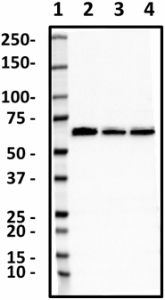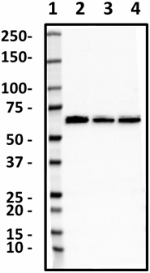- Clone
- A17137B (See other available formats)
- Regulatory Status
- RUO
- Other Names
- p21-activated kinase 1
- Isotype
- Mouse IgG2b, κ
- Ave. Rating
- Submit a Review
- Product Citations
- publications

-

Western blot of purified anti-PAK1 antibody (clone A17137B). Lane 1: Molecular weight marker; Lane 2: 10 µg of human brain lysate; Lane 3: 10 µg of mouse brain lysate; Lane 4: 10 µg of rat brain lysate. The blot was incubated with 0.1 µg/mL of the primary antibody overnight at 4°C, followed by incubation with HRP-labeled goat anti-mouse IgG (Cat. No. 405306). Enhanced chemiluminescence was used as the detection system.
| Cat # | Size | Price | Quantity Check Availability | Save | ||
|---|---|---|---|---|---|---|
| 868601 | 25 µg | £73 | ||||
PAK1 is a ubiquitously expressed protein that belongs to the group I PAK family of serine/threonine kinases, which are important mediators that link the Rho family GTPase signaling to cytoskeleton remodeling. PAK1 activation has been shown to play a role in tumorgenesis, actin dynamics, cell cycle progression, cell motility, and angiogenesis. The PAK family of kinases is affected in several brain diseases, including neurofibromatosis model of autism, Alzheimer’s disease, Fragile X syndrome, and schizophrenia1. Recent studies using electrophysiological recordings of hippocampal CA1 synaptic currents suggest that PAK1 plays a role in inhibitory synaptic transmission, where knocking out PAK1 affects the excitatory/inhibitory balance in the hippocampus, and may lead to dysregulation of synaptic strength.
Product DetailsProduct Details
- Verified Reactivity
- Human, Mouse, Rat
- Antibody Type
- Monoclonal
- Host Species
- Mouse
- Formulation
- Phosphate-buffered solution, pH 7.2, containing 0.09% sodium azide.
- Preparation
- The antibody was purified by affinity chromatography.
- Concentration
- 0.5 mg/ml
- Storage & Handling
- The antibody solution should be stored undiluted between 2°C and 8°C.
- Application
-
WB - Quality tested
- Recommended Usage
-
Each lot of this antibody is quality control tested by Western blotting. For Western blotting, the suggested use of this reagent is 0.1 - 1.0 µg per ml. It is recommended that the reagent be titrated for optimal performance for each application.
- RRID
-
AB_2814622 (BioLegend Cat. No. 868601)
Antigen Details
- Structure
- PAK1 is a 545 amino acid protein with predicted and observed molecular mass of ~61 kD.
- Distribution
-
Tissue distribution: Ubiquitously expressed in all tissues
Cellular distribution: Cytosol, plasma membrane, and nucleus - Function
- PAK1 plays an important role in regulating cytoskeletal dynamics, spine morphology, and synaptic plasticity.
- Interaction
- PAK1 forms homodimers, and interacts with: NISCH, DVL1, MUSK, CDC2L1, CDC2L2, p110C, CDC42/P21, RAC1, DSCAM, PDPK1, RAF1, NCK1, and NCK2.
- Biology Area
- Apoptosis/Tumor Suppressors/Cell Death, Cell Adhesion, Cell Motility/Cytoskeleton/Structure, Cell Proliferation and Viability, Cell Structure, Neurodegeneration, Neuroinflammation, Neuroscience, Neuroscience Cell Markers, Synaptic Biology
- Molecular Family
- Cytoskeletal Proteins, Enzymes and Regulators, GPCR, Microtubules, Protein Kinases/Phosphatase
- Antigen References
-
- Xia S, et al. 2018. Small GTPases. 9(4):322
- Kreis P, et al. 2009. Cell Signal. 21(3):384
- Nikolic M. 2008. Mol Neurobiol. 37(2-3): 187
- Salminen A, et al. 2008. Biochem Biophys Res Commun. 371(4):587
- Gene ID
- 5058 View all products for this Gene ID 18479 View all products for this Gene ID 29431 View all products for this Gene ID
- UniProt
- View information about PAK1 on UniProt.org
Related FAQs
Other Formats
View All PAK1 Reagents Request Custom Conjugation| Description | Clone | Applications |
|---|---|---|
| Purified anti-PAK1 | A17137B | WB |
Compare Data Across All Formats
This data display is provided for general comparisons between formats.
Your actual data may vary due to variations in samples, target cells, instruments and their settings, staining conditions, and other factors.
If you need assistance with selecting the best format contact our expert technical support team.
-
Purified anti-PAK1

Western blot of purified anti-PAK1 antibody (clone A17137B)....

 Login / Register
Login / Register 







Follow Us